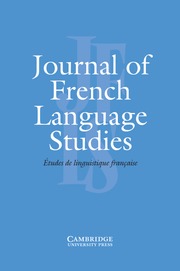Article contents
Reflections of the French nasal vowel shift in orthography on Twitter
Published online by Cambridge University Press: 13 July 2022
Abstract
Non-standard orthography on social media provides a useful supplementary data source for sociophonetic research. Regarding an ongoing chain shift in Northern Metropolitan French nasal vowels, spellings reflecting shifted vowel targets are observed on Twitter. These non-standard spellings, e.g. avont [avɔ̃] for avant /avɑ̃/ ‘before’, provide insight into speakers’ awareness of this change and its lexical distribution. Tweets with shifted and standard spellings of 306 word forms containing the phonemes /ɛ̃/, /œ̃/, /ɑ̃/ and /ɔ̃/ were collected from an 870-million word Internet Archive corpus of French tweets from 2011–2017. Shifted spellings were found for all four vowels and 168 words. The shifted spelling rate is lower than that of comparable variables in English and is not conditioned by stress, grammatical category, frequency, or phonological context, which affect the distribution of shifted nasal vowels in speech. However, frequent words show more indications of intentional misspelling, such as repetition and capitalization of the target vowel, suggesting that some speakers are conscious of the variation and comment on it using salient words. The results also contribute to an ongoing debate about a possible merger between /ɛ̃/ and /œ̃/, supporting the hypothesis of an incomplete merger where /ɛ̃/ shifts towards [ɑ̃] but /œ̃/ does not.
- Type
- Article
- Information
- Journal of French Language Studies , Volume 32 , Special Issue 2: Special Issue (French Variation in Digital Media) , July 2022 , pp. 197 - 215
- Copyright
- © The Author(s), 2021. Published by Cambridge University Press
References
- 2
- Cited by



